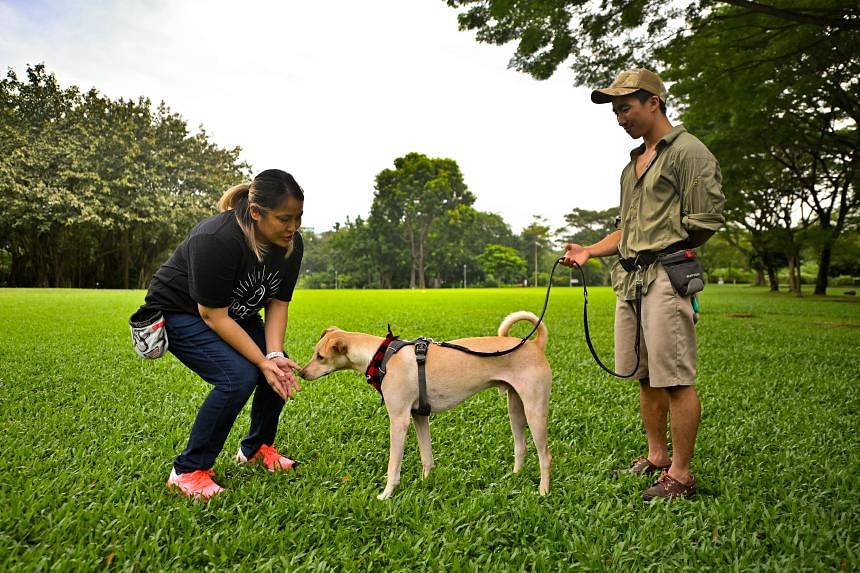SINGAPORE – Dog trainers will now have to be certified by international animal training organisations in order to get accredited in Singapore, as part of efforts by the National Parks Board’s Animal and Veterinary Service (AVS) to improve pet welfare.
Under these international training programmes, science-based techniques that use minimal physical force are taught, with other topics, including animal behavioural psychology, also covered.
Trainers will also have to achieve a certain number of continuing education units to renew their certification every three to five years.
These stricter standards come under the AVS-Accredited Certified Dog Trainer (ACDT) scheme that was launched on Saturday.
Trainers currently accredited by the Panel for the Accreditation of Dog Trainers scheme will have a two-year grace period to retain their accreditation by getting certified internationally.
It is voluntary for trainers to be accredited under the ACDT scheme.
The new moves are aimed at making dog training less physically intrusive for the animals, and shifting the focus of accreditation towards being a trainer who can safeguard animal well-being.
Previously, trainers only had to send in a demonstration video of a dog trained by them following basic commands, such as “sit”, alongside client recommendations, for an assessment by an expert panel.
Dr Chang Siow Foong, group director of AVS’ professional and scientific services division, said there are 21 trainers in Singapore accredited, out of the estimated 100 to 120 operating here.
He noted that most trainers here begin training dogs as a hobby before extending their services informally to others. But most of this training experience is often supported only by anecdotal study, and does not have any foundation in science, he added.
This can be an issue, especially when physical punishment – such as the use of force or the use of devices such as electric collars – has been demonstrated to be able to get dogs to behave.
This leads trainers to use such methods despite worsening a dog’s overall psychology.
According to a Straits Times report in July, dog training and daycare centre K9 Connection has had its accreditation suspended since March after a dog was abused for bad behaviour.
Applications to the international programmes can be done online.
The programmes cost an average of $300 and the duration will depend on the course providers.
More information can be found on NParks’ website.
While some trainers might consider these programmes costly, professional dog trainer Anna Koo said they are not exorbitant for the legitimacy it confers on trainers who have passed the programme.
Ms Koo, who received her certificate from the Certification Council for Professional Dog Trainers – one of the international programmes accepted by AVS – five years ago, said the price will be able to sift out trainers not committed to a dog’s well-being, and allow the accreditation to more accurately signal a trainer’s professionalism.
She added: “It’s like being a doctor – you need to pay for the education in order to know what you’re doing.
“After all, you’re affecting the life of the dog and the lives of the humans who live with the dog.”
Dr Chang added that while this scheme makes it more difficult to achieve accreditation and therefore will not directly help with getting more informal trainers accredited, he hopes that more awareness will be raised for science-based training methods.
“With dog trainers being certified to international standards of care for the ACDT scheme, we are trying to signal to Singaporeans to respect the science behind this training,” he said.
At the launch of the ACDT on Saturday, Senior Minister of State for National Development Tan Kiat How said this scheme builds on the dog training and behaviour rehabilitation guidelines that were renewed in January.
Under those guidelines, the “least intrusive, minimally aversive” approach is recommended for all trainers, who are encouraged to use reward-based methods, rather than punishment-based ones.
Mr Tan added: “Several pet owners I have spoken to have shared how their pets provide good companionship and enhance their quality of life.
“So as more Singaporeans discover the joys of keeping animals as companions, it is important that we press on with our efforts to promote responsible pet ownership.”
Editor’s note: This article has been edited for clarity.


